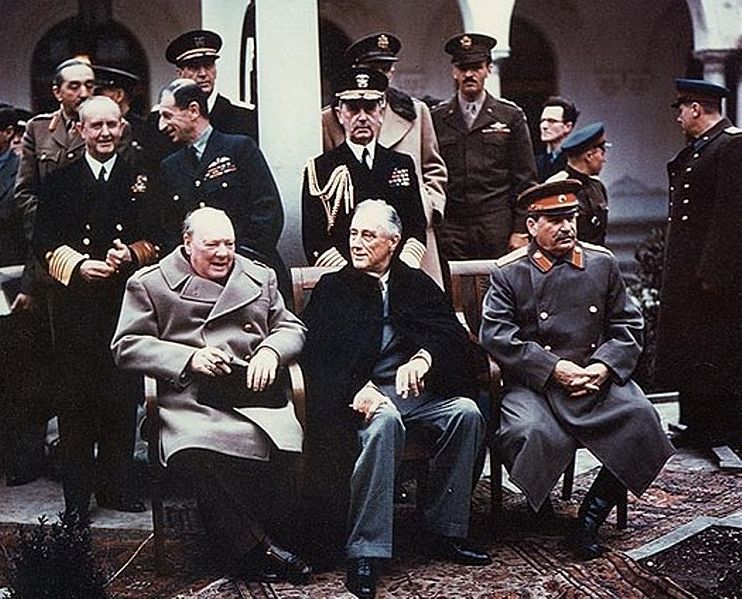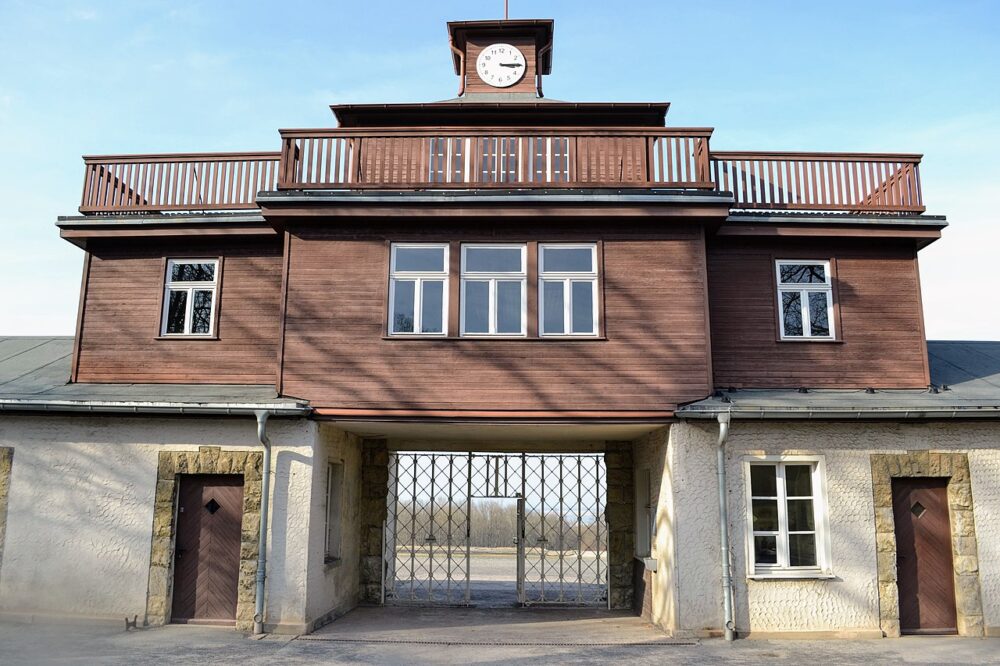The world is finally within months of bringing World War Two to a conclusion, as U. S. troops and Allied forces from other nations are slowly regaining full control of Europe from the Nazis and working their way across the Pacific in preparation for the attack on the Japanese homeland.
In the day’s earlier news reports by Savoy Express reporter Ed Baxter, listeners to XM Radio’s Track Number Four would hear this:
In the news for … April 12th … 19-45 … Allied forces in Europe and the Pacific continue their forward movement … even though going is not necessarily easy.
In Germany … General Patton’s troops have discovered a vast storehouse of art treasures along with the entire Reichsbank gold reserves … hidden in a salt mine near the city of Mulhausen. And, at Essen … the U-S Ninth Army has taken control of the massive Krupp plant, the major source for German armaments. At the German naval base at Kiel … British Royal Air Force bombers have damaged the Admiral Scheer, one of Germany’s two remaining pocket battleships, and the heavy cruiser, Admiral Hipper, so severely that both are pretty much done for.
In the Philippines … while U-S troops are making steady progress in capturing the main island of Luzon … things are pretty much at a standstill on Okinawa. However, in the waters off Okinawa … Japanese kamikaze attacks have crippled the aircraft carrier Enterprise and damaged the battleship Missouri.
Here at home … President Franklin Roosevelt continues his stay at his vacation home, called “the Little White House,” in Warm Springs, Georgia… as he seeks to improve his physical condition. When he returned from the fourteen thousand mile trip to the Black Sea port of Yalta to meet with British Prime Minister Winston Churchill and Soviet Premier Joseph

Stalin, in which they set in place the final strategy for victory in Europe … it was apparent he was exhausted and in need of rest …if he was to regain his strength. As his planned two weeks’ stay in Georgia nears an end … reporters were told that today the President is sitting for his portrait to be painted, dressed in a double-breasted gray suit and crimson tie. The artist is Elizabeth Shoumatoff, a friend of Mr. Roosevelt’s long-time secretary, Lucy Rutherford.
Finally … this late word just in from Germany … U-S soldiers have liberated the Nazi concentration camp, “Buchenwald.” No more details are available at this moment … but I’m certain more information will be forthcoming in the days ahead about what is anticipated to be some truly gruesome findings.

This … is Ed Baxter. And … that’s our report for April 12th … 19…45.
However, by dinnertime on the East Coast, Ed Baxter was reporting this:
In the news for … April 12th … 19-45 … This is the sad message that our nation heard just a short time ago … “we interrupt this program to bring you a special news bulletin … a press association has just announced that President Roosevelt is dead! The President died this afternoon of a cerebral hemorrhage.”
Yes, Franklin Delano Roosevelt … in his 13th year and fourth term as our President … has died at age sixty-three. In late February, Mr. Roosevelt had traveled to Yalta in the Soviet Union, where he met with Russian leader Joseph Stalin and British Prime Minister Winston Churchill. He returned from these meetings drawn and sick … and went almost immediately to his vacation home in Warm Springs, Georgia, for rest. However, recuperation did not come … and, this afternoon, he suffered a massive cerebral hemorrhage … a catastrophic form of a stroke caused by a ruptured blood vessel in the brain. Mr. Roosevelt, who was known to have suffered from severe high blood pressure for quite some time … was pronounced dead at three-thirty-five P-M Eastern Time.

Elected as our thirty-second president in 19-32 … as the nation was deep in the Great Depression … Franklin Delano Roosevelt exhibited strong leadership and set into motion programs that led the United States out of the Depression and through a war that is truly worldwide … to a point where the “balance of power” is firmly on the side of the U. S. and our Allies.
In Washington … Vice-President Harry Truman and members of the President’s Cabinet were summoned to the White House … and Mr. Truman
has been sworn in as the new president of these United States.

It is expected that President Roosevelt will be buried at the family home on the banks of the Hudson River in Hyde Park, New York … after having died this afternoon at his vacation home in Warm Springs, Georgia … at age 63.
This … is Ed Baxter. And … that’s our report for April 12th … 19…45.
Who was Harry Truman? A former small businessman from Independence, Missouri, entered politics as a U. S. Senator from that state. He had been Vice-President for only three months when, suddenly, finding himself elevated to the leader of the nation in the midst of an all-consuming war.
The Democratic Party bosses had decided Roosevelt’s former Vice-President, Henry Wallace, was too intellectual, and they did not really trust him, as he was formerly a Republican. Mr. Truman was considered a good “compromise” choice, as he was not considered offensive to the various branches of the party. However, he was reluctant to accept until Mr. Roosevelt insisted.
Yet, after being elected and sworn into office, he and the President had very little contact, and he was not really brought into the White House “inner circle,” spending most of his time presiding over the Senate — therefore was not fully prepared for the challenge he’d suddenly face when unexpectedly being called to the White House on that April 12th afternoon.
When arriving, he was met by Eleanor Roosevelt, who told him the President had died. Then came that famous exchange between the two:
When Mr. Truman asked what he could do for Mrs. Roosevelt, she replied, “Is there anything we can do for you? You are the one in trouble now.”
As I wrote in my radio memoir, RADIO, My Love, My Passion: “… that afternoon, I walked into the house and found my mother ironing with the radio on, playing sad-sounding music. I sensed something was wrong, and then Mother said, ‘President Roosevelt died today.’ In that era, radio was how we heard and learned about important events.”
Based on the history books — and what I, although still quite young, saw and experienced during the nearly eight years President Truman was in office — the Truman years were good years for our nation and its people! To be honest, the Korean War did start during Truman’s presidency, but it was not his doing … that’s another story for another day.
In the words of Walter Cronkite:
And that’s the way it was … April 12th, 1945!



